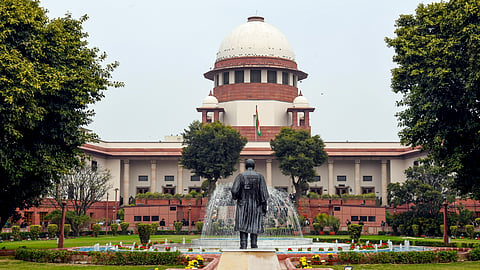What the Supreme Court said on Governor’s powers
In a landmark ruling delivered on Wednesday, the Supreme Court clarified the powers and responsibilities of Governors in India regarding the bills presented to them by State legislatures under Article 200 of the Constitution.
The Bench, comprising Justices JB Pardiwala and R. Mahadevan, highlighted the importance of Governors not undermining the democratic will of the people and introduced measures to prevent undue delays in the decision-making process. The judgment set out specific timelines for Governors to act on bills sent to them.
Governor's Role Under Article 200
Article 200 of the Indian Constitution outlines the procedure a Governor must follow when presented with a bill passed by the State legislature. The Governor has three options: To give assent to the bill, to withhold assent to the bill and reserve the bill for consideration by the President of India.
The Supreme Court ruled that when the Governor withholds assent and returns a bill to the legislature, the bill will lapse unless the legislature reconsidered it based on the Governor's suggestions and re-passes it.
The Governor is under obligation to follow a clear procedure when withholding assent, and the Constitution demands action without unnecessary delays. The Court stressed that inaction is not an option, and the Governor must promptly decide on one of the three prescribed courses of action.
No Veto Power for Governors
The Supreme Court stressed that the Governor does not possess a veto power, meaning they cannot simply refuse to act on a bill indefinitely. The phrase “as soon as possible” in the first proviso to Article 200 imposes an expectation of urgency. The Governor is not permitted to exercise a “pocket veto,” where they delay or withhold assent without valid constitutional reasons. The Court made it clear that Governors must act swiftly and avoid any undue delay in processing bills.
Then the Supreme Court ruled that the Governor cannot reserve a bill for the President after it has already been reconsidered by the legislature. Once a bill is re-presented to the Governor after being sent back to the legislature, the Governor must either assent to it or take one of the other two available actions under Article 200. If the bill is identical to the one initially presented, the Governor cannot send it for Presidential consideration again.
In this case, the Court found the Tamil Nadu Governor's actions to be illegal. The Governor had reserved ten bills for the consideration of the President, despite the bills being re-presented to him after being reconsidered by the State legislature. The Court held that this was an erroneous exercise of power and ordered that any subsequent action taken by the President regarding those bills would not stand. The bills were deemed to have been assented to by the Governor on the date they were reconsidered by the legislature. This decision was made under the Court's inherent powers under Article 142 of the Constitution, ensuring complete justice in the case.
Timelines for Governors
Although Article 200 does not specify a strict timeline for the Governor’s actions, the Court observed that it would be unreasonable to allow indefinite delays in deciding on bills. The phrase “as soon as possible” in the Constitution infuses a sense of urgency, and the Governor must act within a reasonable time. To establish a judicial standard and prevent arbitrary delays, the Court introduced specific timelines for Governors to follow:
If the Governor withholds assent or reserves a bill for the President, they must act within a maximum of one month, based on the advice of the State Council of Ministers.
If the Governor withholds assent contrary to the advice of the State Council of Ministers, they must return the bill, along with a message, within three months.
If the Governor reserves a bill for the President against the advice of the State Council, they must do so within three months.
If a bill is re-presented to the Governor after reconsideration, they must grant assent within a maximum of one month.
Failure to comply with these timelines will subject the Governor’s inaction to judicial review, ensuring that the democratic process is not hindered by unnecessary delays.
Governor's Discretion and Judicial Review
The Supreme Court clarified that the Governor must generally act on the advice of the State Council of Ministers, with few exceptions as outlined in the Constitution. The only instances where the Governor can exercise discretion are those specifically required by the Constitution, such as the reservation of bills for Presidential consideration. This approach is consistent with the broader principle that the Governor, as a formal head of state, acts on the advice of the Council of Ministers, except where discretion is explicitly mandated.
In this context, the Court overruled a previous judgment in the BK Pavitra case, which had suggested that Governors possess discretion regarding the reservation of bills for the President. The Court found this judgment to be inconsistent with earlier rulings, particularly the Shamsher Singh case, which clarified that the Governor's powers should generally align with the advice of the State Council of Ministers.
The Supreme Court reinforced the principle that judicial review is a fundamental feature of a written constitution. Governors' actions under Article 200, including withholding assent or reserving bills for the President, are subject to judicial scrutiny, as long as they fall within the constitutional limits. The Court affirmed that such decisions could be reviewed if they were made without proper constitutional justification.

